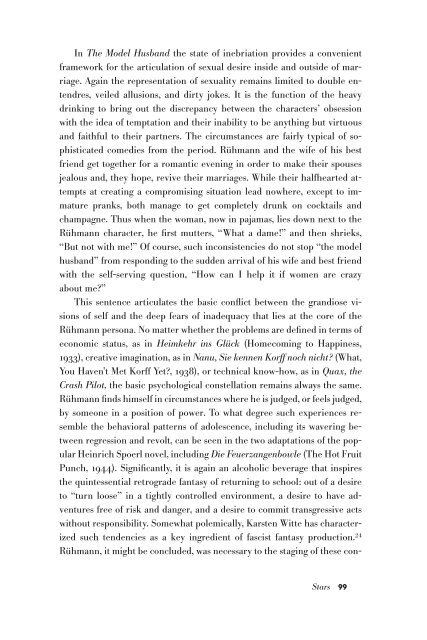You also want an ePaper? Increase the reach of your titles
YUMPU automatically turns print PDFs into web optimized ePapers that Google loves.
In The Model Husband the state of inebriation provides a convenient<br />
framework for the articulation of sexual desire inside and outside of marriage.<br />
Again the representation of sexuality remains limited to double entendres,<br />
veiled allusions, and dirty jokes. It is the function of the heavy<br />
drinking to bring out the discrepancy between the characters’ obsession<br />
with the idea of temptation and their inability to be anything but virtuous<br />
and faithful to their partners. The circumstances are fairly typical of sophisticated<br />
comedies from the period. Rühmann and the wife of his best<br />
friend get together for a romantic evening in order to make their spouses<br />
jealous and, they hope, revive their marriages. While their halfhearted attempts<br />
at creating a compromising situation lead nowhere, except to immature<br />
pranks, both manage to get completely drunk on cocktails and<br />
champagne. Thus when the woman, now in pajamas, lies down next to the<br />
Rühmann character, he first mutters, “What a dame!” and then shrieks,<br />
“But not with me!” Of course, such inconsistencies do not stop “the model<br />
husband” from responding to the sudden arrival of his wife and best friend<br />
with the self-serving question, “How can I help it if women are crazy<br />
about me?”<br />
This sentence articulates the basic conflict between the grandiose visions<br />
of self and the deep fears of inadequacy that lies at the core of the<br />
Rühmann persona. No matter whether the problems are defined in terms of<br />
economic status, as in Heimkehr ins Glück (Homecoming to Happiness,<br />
1933), creative imagination, as in Nanu, Sie kennen Korff noch nicht? (What,<br />
You Haven’t Met Korff Yet?, 1938), or technical know-how, as in Quax, the<br />
Crash Pilot, the basic psychological constellation remains always the same.<br />
Rühmann finds himself in circumstances where he is judged, or feels judged,<br />
by someone in a position of power. To what degree such experiences resemble<br />
the behavioral patterns of adolescence, including its wavering between<br />
regression and revolt, can be seen in the two adaptations of the popular<br />
Heinrich Spoerl novel, including Die Feuerzangenbowle (The Hot Fruit<br />
Punch, 1944). Significantly, it is again an alcoholic beverage that inspires<br />
the quintessential retrograde fantasy of returning to school: out of a desire<br />
to “turn loose” in a tightly controlled environment, a desire to have adventures<br />
free of risk and danger, and a desire to commit transgressive acts<br />
without responsibility. Somewhat polemically, Karsten Witte has characterized<br />
such tendencies as a key ingredient of fascist fantasy production. 24<br />
Rühmann, it might be concluded, was necessary to the staging of these con-<br />
Stars 99

















